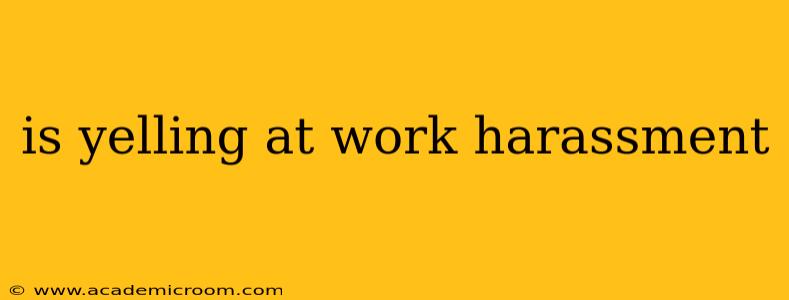Yelling at work is a serious issue that can significantly impact employee well-being and create a hostile work environment. While not all yelling constitutes harassment, it frequently crosses the line into abusive behavior, especially when it's persistent, directed at a specific individual, or creates a climate of fear and intimidation. This article explores the nuances of yelling in the workplace and clarifies when it constitutes harassment.
What Constitutes Harassment in the Workplace?
Workplace harassment, including verbal harassment, is unwanted conduct that affects the dignity or creates a hostile work environment. This goes beyond simple disagreements or occasional raised voices. Harassment is characterized by behavior that is:
- Repeated: A single incident of yelling might be a momentary lapse in professionalism, but repeated yelling over time constitutes a pattern of abusive behavior.
- Targeted: Yelling directed specifically at one individual, particularly based on protected characteristics like race, gender, religion, or sexual orientation, is a clear indicator of harassment.
- Intimidating: The tone, volume, and context of the yelling matter. If it creates a feeling of fear, anxiety, or humiliation, it likely crosses the line into harassment.
- Unreasonable: While occasional strong words might occur, persistently yelling at employees for minor infractions or without just cause points toward a pattern of abusive conduct.
- Creates a hostile work environment: This includes a situation where yelling is commonplace, making employees feel uncomfortable, unsafe, and unable to perform their jobs effectively.
Is Yelling Always Harassment?
No, not all yelling at work constitutes harassment. A single instance of raised voice in a heated discussion, especially if both parties are equally involved and it's quickly resolved, might not be considered harassment. However, the context is crucial. The key is whether the yelling is part of a pattern of behavior that creates a hostile or abusive work environment.
When Does Yelling Become Workplace Bullying?
Workplace bullying often involves a power imbalance, where one individual consistently uses aggressive or intimidating behavior towards another. Yelling can be a significant component of workplace bullying, especially when it's accompanied by other forms of abuse, such as:
- Threats: Implied or explicit threats related to job security or other aspects of employment.
- Humiliation: Publicly shaming or belittling an employee.
- Isolation: Intentionally excluding an employee from work activities or information.
- Undermining: Constantly criticizing work performance or sabotaging projects.
How to Address Yelling at Work
If you're experiencing yelling at work, you should:
- Document incidents: Keep a record of dates, times, witnesses, and specifics of each yelling incident.
- Report the behavior: Inform your supervisor, HR department, or a designated employee representative. Most organizations have policies prohibiting harassment and bullying.
- Seek support: Talk to colleagues, friends, or family members for emotional support. You might also consider seeking professional counseling if the situation is causing significant distress.
What are the Legal Ramifications of Yelling at Work?
The legal implications of yelling at work depend on local laws and the specific circumstances. In many jurisdictions, consistently yelling that creates a hostile work environment is illegal. Laws against workplace harassment and discrimination offer protection against such behavior.
Can I Sue My Employer for Yelling?
You may have grounds to sue your employer for yelling if it meets the legal definition of workplace harassment or bullying in your jurisdiction, and has negatively impacted your well-being and employment. It's essential to consult with an employment lawyer to determine if you have a valid case.
This information is for general guidance only and does not constitute legal advice. It's crucial to consult with a legal professional for advice tailored to your specific situation. Remember, a safe and respectful workplace is a fundamental right, and you shouldn't tolerate abusive behavior.
